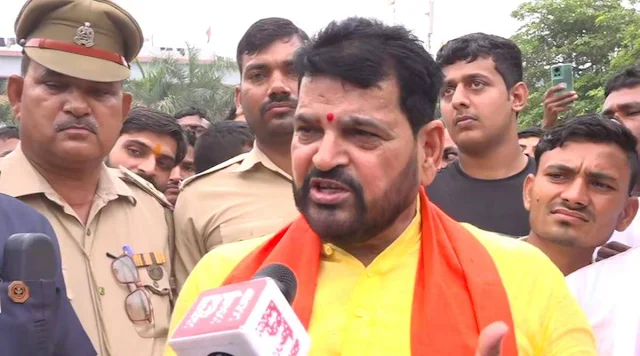The National Federation of Indian Women (NFIW) on Delhi Police cancelling POCSO case against BJP MP Brij Bhushan Sharan Singh:
It was clear from the outset that Delhi Police wanted to save the accused from getting arrested based on the complaint of a minor wrestler. They have clearly forgotten their duty to society, and the Special Police Unit for Women and Children of the Delhi Police is just an eyewash for the public. There is evidently no morality or integrity left in the leadership of the Delhi Police. They have violated whatever is mandated in the POSH Act to prevent sexual harassment at workplace, and POCSO Act to protect children from sexual abuse and violence. The wrestlers were forced to approach the Supreme Court and it was only with the intervention of the Hon’ble Court, that the Delhi police filed the FIR. It seems that the police have taken on the role of being protectors of BJP affiliated persons who molest and rape women and children rather than the women and children that they are mandated to protect.
Delhi Police has given enough time and allowed the accused to roam freely with impunity and political patronage and address media and public meetings, on a daily basis, while threatening and intimidating the complainants, including the minor.
It is evident that instead of ensuring witness protection they were busy in watering down the seriousness of the case and writing a five hundred page cancellation application for the POCSO case. This case has ensured that the women and children in this country should have no faith in the police, particularly under BJP rule.
NFIW demands:
1- Fast track court to try the case at the earliest.
2- Time bound investigation and action against perpetrators of sexual violence.
3- A SC monitored trial for all the cases of the wrestlers, including that of the minor.
***
National Federation of Indian Women (NFIW) strongly condemns the way Delhi Police filed the application to cancel the POCSO case against BJP MP Brij Bhushan Sharan Singh, and the manner in whichthey carried out the inquiry for filing a chargesheet against him in the sexual harassment case by the other wrestlers. Two FIRs were filed against the BJP MP, and the then WFI President under POCSO and POSH Acts by the Wrestlers. NFIW also condemns the way the police manhandled and dragged wrestlers and other women who were protesting in a peacefully and legitimately against the delay in getting justice.It was clear from the outset that Delhi Police wanted to save the accused from getting arrested based on the complaint of a minor wrestler. They have clearly forgotten their duty to society, and the Special Police Unit for Women and Children of the Delhi Police is just an eyewash for the public. There is evidently no morality or integrity left in the leadership of the Delhi Police. They have violated whatever is mandated in the POSH Act to prevent sexual harassment at workplace, and POCSO Act to protect children from sexual abuse and violence. The wrestlers were forced to approach the Supreme Court and it was only with the intervention of the Hon’ble Court, that the Delhi police filed the FIR. It seems that the police have taken on the role of being protectors of BJP affiliated persons who molest and rape women and children rather than the women and children that they are mandated to protect.
Delhi Police has given enough time and allowed the accused to roam freely with impunity and political patronage and address media and public meetings, on a daily basis, while threatening and intimidating the complainants, including the minor.
It is evident that instead of ensuring witness protection they were busy in watering down the seriousness of the case and writing a five hundred page cancellation application for the POCSO case. This case has ensured that the women and children in this country should have no faith in the police, particularly under BJP rule.
NFIW demands:
1- Fast track court to try the case at the earliest.
2- Time bound investigation and action against perpetrators of sexual violence.
3- A SC monitored trial for all the cases of the wrestlers, including that of the minor.


Comments